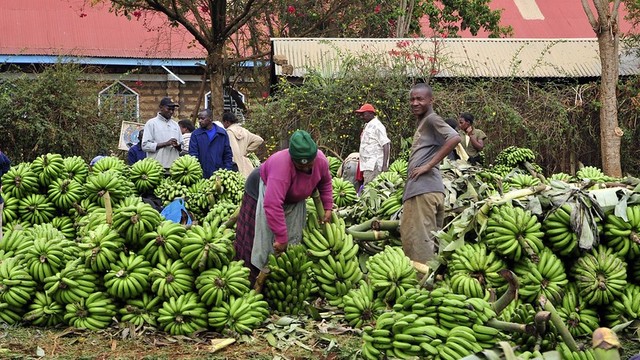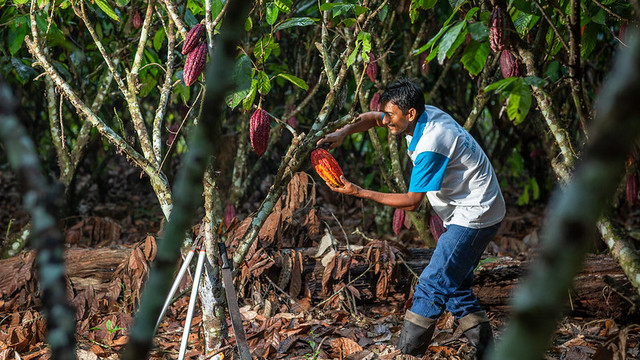Agroecology offers FAO a 'new window' on agriculture
Long-neglected by mainstream development actors, agroecology is gaining momentum as a farming and landscape approach – as a recent Food and Agriculture Organisation (FAO) symposium demonstrates.


Delegates at the international symposium on agroecology (Photo: John Choptiany/FAO)
'Caminamos juntos!' – 'Let's walk together' – said the director-general of FAO, José Graziano da Silva, addressing around 400 people at the International Symposium on Agroecology for Food Security and Nutrition (Rome, 18 and 19 September). Delegates from very different backgrounds had gathered to explore a common interest: agroecology and how it can be applied at scale.
Agroecology uses ecological concepts and principles to design and manage sustainable agro-ecosystems, offering benefits for productivity, food security, environmental sustainability, and important ecosystem services such as climate change mitigation. It differs from conventional farming because its primary aim is sustainability (not productivity) and because its scope encompasses the agro-ecosystem (going far beyond the individual farm, let alone the plot!).
Coming of age
In the past few years, agroecological movements have strengthened their political influence not only in Latin America, where organisations have been active for more than 30 years, but also in Africa, especially through the Food Sovereignty movement, and in Europe, where countries such as France and Switzerland have included agroecology in their agricultural policy frameworks.
At the same time, several publications released by civil society organisations such as ActionAid, by academic institutions such as the UK's Coventry University and by international development organisations such as UNCTAD, have further raised agroecology's public profile.
Agroecological approaches are increasingly at the centre of debates on food security and food systems. Indeed, in the last month alone I've attended three large events on the topic. In early September I presented the IIED paper Agroecology: what it is and what it has to offer at an international conference held by the Agro-ecological Network Denmark. The meeting registered interest from more than 150 people. Around two weeks later, I joined 87 people from academia, civil society organisations and the private and the public sectors (including members of the Dutch Parliament) at an expert meeting aiming to informing a policy note the Dutch government is developing on food security.
Reaching wider
The FAO symposium came last and was especially inspiring. It was the largest event ever organised on agroecology, comprising lectures by international experts and over 30 presentations that shared evidence from research programmes (for example the French National Institute for Agricultural Research), successful agricultural projects and longstanding experience from farmers' networks and organisations such as MAELA in Latin America and the Caribbean. Importantly, the symposium also offered many opportunities for discussion and networking among diverse stakeholders drawn from a wide range of situations.

Adapted from Silici, L. 2014. Agroecology: what it is and what it has to offer
Ecological intensification for sustainable food systems
A final plenary session chaired by Stephen Gliessman (the Alfred E. Heller professor of agroecology at University of California, and one of the most prolific author on the topic), and Pablo Tittonell (professor of farming systems ecology at Wageningen University in the Netherlands), took stock of the two days. The plenary produced a useful discussion on policy implications and action points (which I hope will be reported in the proceedings of the symposium). But, in my view, two more fundamental considerations also emerged from the session.
On the one hand, the policy agenda for world agriculture should be ambitious in pursuing ecological intensification through agroecological farming. As agroecology has a clear set of ecological principles (see above) it offers 'easy to assess' guidelines against which to judge farming and landscape practices that benefit the environment and society.
By contrast, concepts such as 'sustainable intensification' and 'climate-smart agriculture' are loosely defined by their objective of increasing yields through greater environmental efficiency — and that means virtually any technologies can be labelled as 'sustainable', including those less resilient to environmental or economic shocks, such as genetic modified crops.
On the other hand, promoting agroecological practices may not be sufficient to achieve long-term resilience, unless local and global food systems undergo a more structural transformation; food value chains are reoriented towards increased efficiency and re-localisation; and consumers make more thoughtful and healthy choices. So agroecology needs to make the most of its potential as a social movement that can help shape a new social and economic order behind more sustainable food production and consumption systems.
A timely opportunity
Such debates come at a very important time. In the zero draft of the Sustainable Development Goals, 'promoting sustainable agriculture' is not just a means but an explicit target alongside 'ending hunger and improving food security and nutrition', and as such, it will require specific indicators of success. How sustainability is defined in relevant institutional settings (such as FAO) will thus influence how policy makers and technicians will shape these indicators and, more broadly, the global agricultural agenda.
So maybe one of the symposium's main achievements was that it brought often-overlooked agroecology into the FAO setting. The FAO Director-General likened the meeting to "a new window" opened in the cathedral of established thinking. A window may not grant an easy access from the outside, but can definitely let more light and fresh air in! While we might still wait long to see agroecology become a mainstream part of the FAO agenda, a first step has been taken towards opening and exchanging views.
What next?
As a follow up to the symposium, the Brazilian government will host a regional conference in 2015 (Brazil recently launched a National Plan for Agroecology and Organic Production, also known as Brasil Agroecológico (PDF)). The FAO has committed to organising two similar events in Asia and Africa.
Learn more
To learn more about IIED's work on agroecology read: Agroecology: what it is and what it has to offer and visit our page on Building greater local control and resilience into agricultural and food systems.
Laura Silici (laura.silici@iied.org) is a researcher in IIED's Natural Resources Group.



